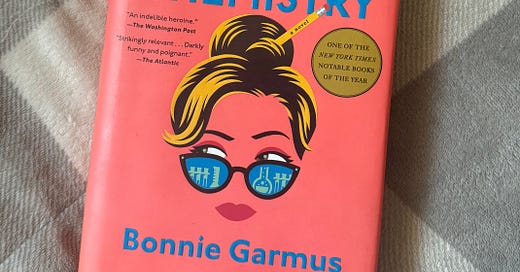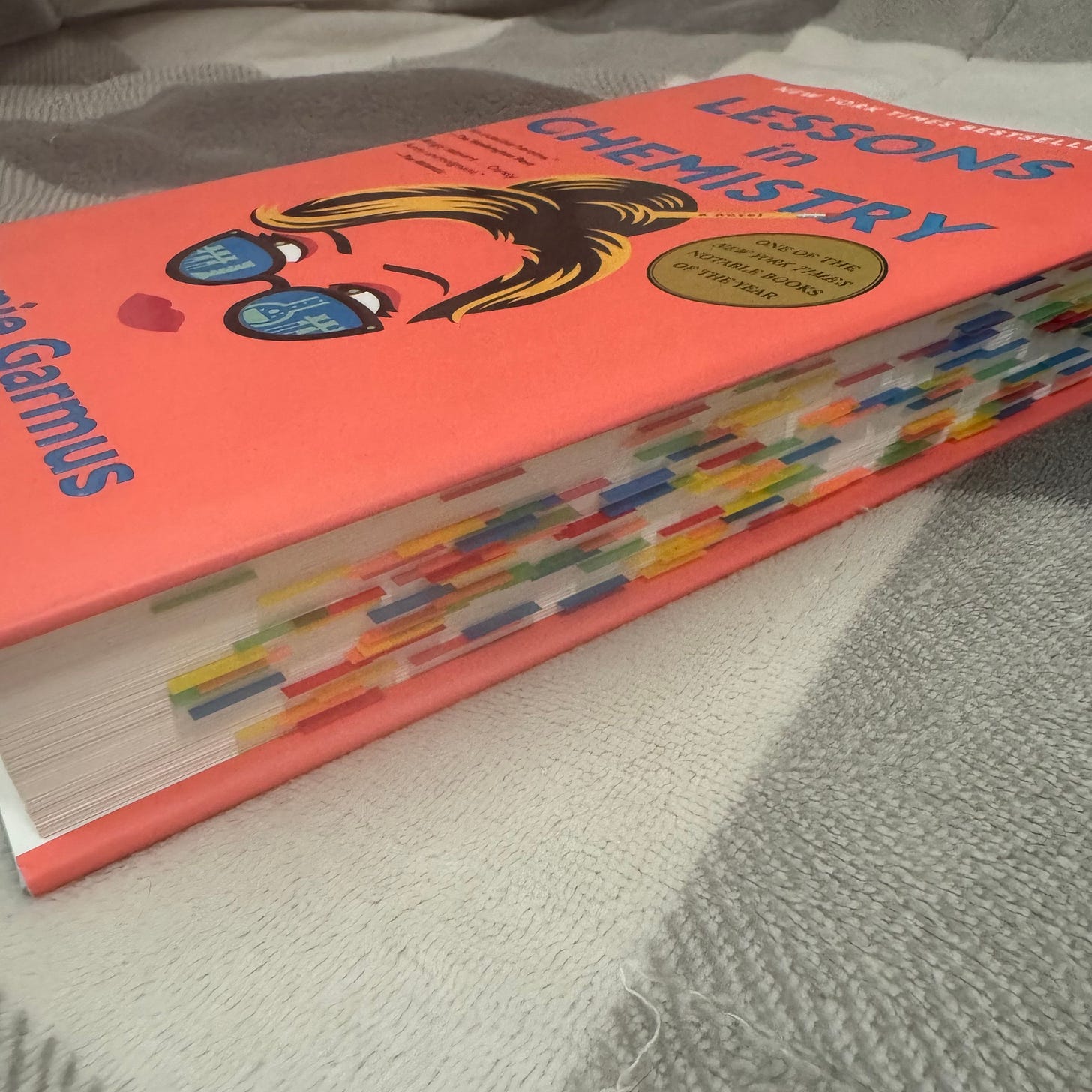Notes on 'Lessons in Chemistry' by Bonnie Garmus
On Bonnie Garmus's debut novel, Elizabeth Zott, and writing about books
“Your ability to change everything—including yourself—starts here.”
After starting the book in September 2023 to try to read it before the Apple TV+ series, starring Oscar-winner Brie Larson, premiered in November 2023, I finally finished Lessons in Chemistry by Bonnie Garmus, and I really, really enjoyed it.
Published in April 2022, Garmus’s debut novel is set in California in the late 1950s and early 1960s and follows Elizabeth Zott, a chemist in an all-male team at Hastings Research Institute. Calvin Evans, a Nobel-prize nominated scientist and an outlier among men who are more than comfortable upholding gender inequality and sexism, falls in love with Elizabeth—and her with him.
A few years go by, and Elizabeth Zott is a single mother who has been fired from her research job. Elizabeth begrudgingly accepts a job as the host of what becomes a popular cooking show, Supper at Six. Through lessons in chemistry, Elizabeth teaches women how to cook—and much, much more.
As always, I suggest researching the book’s subject matter and trigger warnings.
Just know that I tabbed this book (One day, I may be a cool person who writes in the margins, but today is not that day) within an inch of its life. Green was science (Did anyone else dedicate the green notebook to science in school?), orange was quotes I liked, blue was social issues, and yellow was character details.
I marked every time (I wished there were even more!) Elizabeth Zott and Calvin Evans’s love story made me blush or kick my feet or swoon with a red tab. Exhibit A: “…their first kiss cementing a permanent bond that even chemistry could not explain.”
As I read, I started using red tabs for Elizabeth’s relationship with her whip-smart and inquisitive daughter, Mad, and her producer and eventual friend, Walter. I also began flagging red flags in romantic relationships, specifically with Elizabeth’s neighbor Harriet and her husband. More surprisingly, I used the color to note Elizabeth’s dog Six-Thiry’s narrations. Yes, you read that right. Don’t doubt that a dog’s internal monologue will get to you; it will before you know it.
But, as the book progressed, I mostly used red to indicate the presence of grief.
I was struck by how it casually showed up throughout the book, reflecting how grief didn’t stick to a pattern as rigid as scientific studies. It felt like love’s logical extension. I liked how characters mourned the loss of who someone was and what they could’ve been and how that bubbled up organically through the mention of a shared hobby or completing a school project as routine as a family tree. That felt familiar and honest alongside scenes unfolding through snapshots of memories.
As someone who generally struggled with every form of the subject, I greatly appreciated the accessibility of Lessons in Chemistry’s science. I liked that Elizabeth Zott never talked down to her Supper at Six audiences and lifted them up to realize they could understand chemistry. It helped me feel like I could keep up when the opposite was often true in school.
I’m a sucker for anything that makes me feel hopeful and challenges the way I think. So, I’m glad this book can be one of many things that makes me consider my relationship with science with a more optimistic lens. I have also found that meeting science-minded female characters in stories helps.
Watching the women on Grey’s Anatomy for so long has made me read up on the factual sides of the show’s medical cases. One of my all-time favorite fictional female scientists is Liz Ortecho from Roswell, New Mexico. Yes, Liz Parker from the original Roswell series is also a scientist. But guess what? I have enough room in my heart for both characters. More recently, My Lady Jane introduced its alt-history version of Lady Jane Grey, the notorious “Nine Days’ Queen,” interested in changing history and revolutionizing the world with herbal science.
So, mostly, I walked away from Lessons in Chemistry treasuring Elizabeth Zott, a chemist who studied abiogenesis and then brought her skills to daytime TV.
Her characterization and voice were crystal clear from the first page, so I felt I knew her by the last. She became a logical and honest friend I trusted. I believed her when she told the Supper at Six audience—and anyone reading the book—that “Whenever you start doubting yourself,…whenever you feel afraid, just remember. Courage is the root of change—and change is what we’re chemically designed to do.”
That sentiment will stick with me for a very long time—probably forever. I’ll likely pass it on to people in my life before lovingly shoving a copy of this book into their arms. Because when I read it, I could feel that passage altering how I thought about life and my place in it, which was a strange yet welcomed sensation. It’s incredible that books can do that, isn’t it?
Reading Lessons in Chemistry also made me realize I wanted to write about the book. I wanted to write about my reading experience, what I learned from the writing, how the characters affected me, and anything I discovered about the author. But I found that task to be surprisingly daunting.
I’m so comfortable writing about TV that I doubt myself when I write about books now. Even though I have a degree in English, it feels out of my comfort zone. I want to change that with this newsletter, and I can so long as I try. It certainly helps that I find Substack to be a kind and supportive space for writers.
So, even though I can’t keep up with the BookTok and Bookstagram trends, I can write about the books I read at my own pace. Those posts don’t have to look or sound a certain way. They don’t have to be a specific length. They don’t have to be perfect essays like I’m handing in a paper. As much as Amy March’s quote from Louisa May Alcott’s Little Women sticks in my mind (“I want to be great, or nothing”), I don’t have to be great. I want to be better—a better writer, reader, and person.
So, expect to see a lot more bookish writing in this newsletter. While I finish my current read (Nick Hornby’s Fever Pitch), here is some of my favorite supportive evidence, if you will, for when you finish reading Lessons in Chemistry:
“‘It was smart to write when I was so angry’: Bonnie Garmus on the winning formula behind Lessons in Chemistry” by Lisa Allardice for The Guardian
Bonnie Garmus on the wonderful podcast You’re Booked
If you watch the TV show on Apple TV+ (I highly suggest it; it was one of my favorite shows of 2023!) and want to read my thoughts on it, my reviews for Tell-Tale TV are available here.
💌 Shelby
I want to let you, my readers, know I plan to introduce a paid subscription to this newsletter later this summer. With the current state of entertainment journalism, it’s imperative that writers are valued, which is one of the reasons why I like the uplifting community on Substack. I’d greatly appreciate it if you want to pledge a subscription now. I will sprinkle in reminders as the paid subscription’s launch gets closer.






